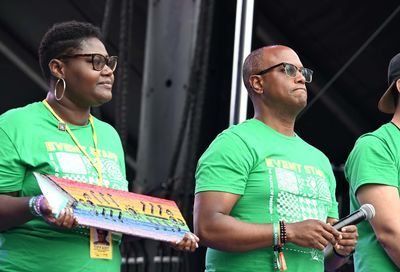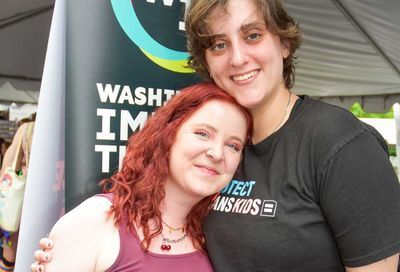Unsettling Similarities
A 1942 military survey illustrates the shortcomings of society's perceived progress
Alex Nicholson, the head of Servicemembers United, put words to the anger that many of us felt when we read the questions the military is asking servicemembers about open gay, lesbian and bisexual military service. He said, ”It is simply impossible to imagine a survey with such derogatory and insulting wording, assumptions and insinuations going out about any other minority group in the military.”
It is, and yet, it happened.
Thanks to Igor Volsky at the Think Progress Wonk Room, we now know exactly what worse assumptions and insinuations could figure into a military survey, as Volsky went to the National Archives this week and dug out the surveys that were used by the military to survey white soldiers before racial integration.
The questions are as striking in their anachronistic tone as they are powerful in their lessons for today’s events.
”In some camps the Army cannot provide separate Recreation Buildings and Service Clubs for Negro and white soldiers. Which of the following things would you do in such a case?”
Only 5 percent of white soldiers from the Northern states in May 1942 answered that question posed to it by the Pentagon by saying that ”white and Negro soldiers should use the same buildings at the same time.” Another 16 percent supported ”white and Negro soldiers us[ing] the same buildings at the same time except on dance nights.”
Except on dance nights. An entire doctoral thesis could be – and probably has been – written on the stereotypes underlying that answer.
More shocking, though, is the revelation that those two choices combined garnered less than 2.5 percent support from Southern soldiers, with 52 percent believing that ”Negro soldiers” should be allowed to use the facilities only ”at certain hours or on certain nights” and 46 percent going further, agreeing that ”[t]he Negro soldiers should find recreation facilities of their own”
Facilities of their own. This option is, to me, the most insidious, because it gave white servicemembers ”permission” to push off the responsibility for responding to continued animus after any desegregation on the black servicemembers.
Nearly 70 years later, servicemembers have been asked a remarkably similar question.
”If Don’t Ask, Don’t Tell is repealed and a gay or lesbian Service member attended a military social function with a same-sex partner, which are you most likely to do?”
Today, however, there is a distinction in the response portion of the question. Servicemembers’ response options range from ”[c]ontinue to attend military social functions” to ”[s]top bringing my spouse, significant other or other family members with me to military social functions” to ”[s]top attending military social functions.”
In today’s survey, which is ongoing, the responsibility for responding to the addition of openly same-sex couples at military social events is placed not on the same-sex couples – there is no ”except on dance nights” option here – but on the heterosexual soldiers who don’t like the change.
This doesn’t excuse the wording or the entire concept of conducting the survey in the first place. It also doesn’t explain the areas missing from the survey – troops are nowhere asked about the impact of DADT discharges and military-enforced discrimination on unit cohesion and troop morale.
This old survey from another time, however, does serve as a stark reminder (one of many this week) that we are and always have been an imperfect nation – and that we are and usually have been seeking to do better.
Chris Geidner is Metro Weekly’s senior political writer. He may be contacted at .
Support Metro Weekly’s Journalism
These are challenging times for news organizations. And yet it’s crucial we stay active and provide vital resources and information to both our local readers and the world. So won’t you please take a moment and consider supporting Metro Weekly with a membership? For as little as $5 a month, you can help ensure Metro Weekly magazine and MetroWeekly.com remain free, viable resources as we provide the best, most diverse, culturally-resonant LGBTQ coverage in both the D.C. region and around the world. Memberships come with exclusive perks and discounts, your own personal digital delivery of each week’s magazine (and an archive), access to our Member's Lounge when it launches this fall, and exclusive members-only items like Metro Weekly Membership Mugs and Tote Bags! Check out all our membership levels here and please join us today!
























